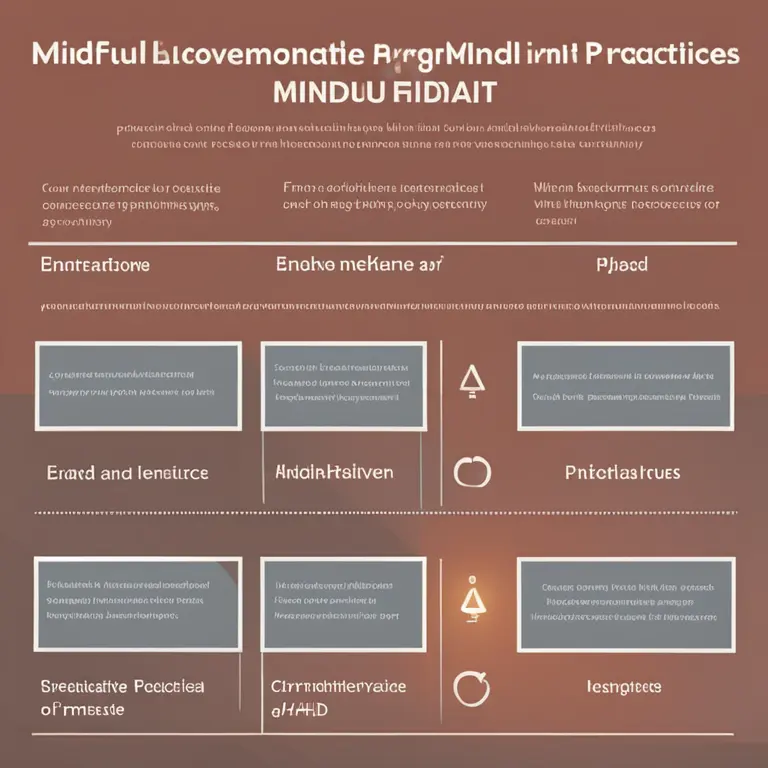
ADHD and Mindfulness Meditation Practices
Discover the benefits and strategies of practicing mindfulness meditation for individuals with ADHD.
article by Hina Kurosawa
Meditation and ADHD: A Valuable Connection
The journey of meditation may seem daunting for those with Attention Deficit Hyperactivity Disorder (ADHD), but it is a path worth treading. Living with ADHD often involves challenges with focus, hyperactivity, and impulsiveness. Meditation, with its emphasis on present-moment awareness, offers a surprising complement to ADHD management strategies. As we approach 2024, the conversation around mindfulness and ADHD has matured, backed by scientific studies and practical techniques tailored specifically to neurodiverse minds. We will explore how individuals with ADHD can benefit from meditation and engage in practices that are both realistic and rewarding.

Building a Meditation Routine for ADHD
Starting a meditation practice can feel particularly overwhelming for someone with ADHD. It's not about achieving a perfect state of calm but more about gradually increasing the capacity for attention. A technique such as a short, daily mindfulness exercise can prove beneficial. Embracing technologies such as meditation apps that incorporate reminders and timers, or even virtual reality meditation environments, which have become more advanced by 2024, can provide structure and stimulation to help maintain focus. Patience and consistency are key — even a few minutes a day can build the foundation for a more attentive and less reactive mind.

The Role of Guided Visualization
Guided visualization is a meditation technique particularly suited to individuals with ADHD, who often excel in creative and visual thinking. By 2024, we’ve seen a rise in customized guided meditations that can hold the attention of those with ADHD through imagery and storytelling. The guides lead listeners on a journey, providing focal points that harness the mind's wandering nature. This dynamic form of meditation can help to cultivate a stronger sense of mental control, and when practiced regularly, it improves focus and relaxation.

Connecting Mindful Movement with ADHD
Mindful movement practices like yoga and tai chi unite physical activity with a meditative focus, which is especially appealing for the hyperactive aspect of ADHD. The incorporation of movement provides an additional layer of sensory input that helps anchor attention. With advancements in online platforms for mindfulness as we approach 2024, accessing specific ADHD-friendly movement classes has never been easier. During practice, the emphasis on breath and deliberate motion reduces impulsivity and brings an inner sense of calm.

The Science Behind Meditation's Effects on ADHD
Over the years leading up to 2024, research has continued to demystify the positive impacts of meditation on the ADHD brain. Neuroimaging studies have found that consistent meditation practice can lead to structural changes in the brain, including areas responsible for attention and emotion regulation. These scientific insights have led to greater endorsement from mental health professionals, who increasingly integrate mindfulness training into ADHD treatment plans. Understanding the neuroscience behind it can encourage those skeptical about the benefits to start their own meditation journey.
Meditation as a Complementary Therapy
It’s crucial to acknowledge that meditation is a complement to, not a replacement for, traditional ADHD treatments like medication and behavioral therapy. As a complementary practice, meditation works hand in hand with these methods to support overall well-being. Wellness plans including meditation promote greater control over attentional resources and emotional responses, which can enhance the effectiveness of other ADHD management tools. In the pursuit of balanced well-being, the synergistic approach that integrates meditation into the therapeutic arsenal remains crucial.
Published: 1/24/2024
Modified: 1/24/2024
More predictions
Come back here soon to learn more about yourself and your future


Soothing Sleep: Meditation for Restful Nights
Discover effective meditation practices to enhance sleep quality and embrace restfulness in this insightful article.


Meditation Techniques for Individuals With ADHD
Discover effective meditation practices tailored for individuals with ADHD to improve focus, reduce hyperactivity, and foster a sense of calm.